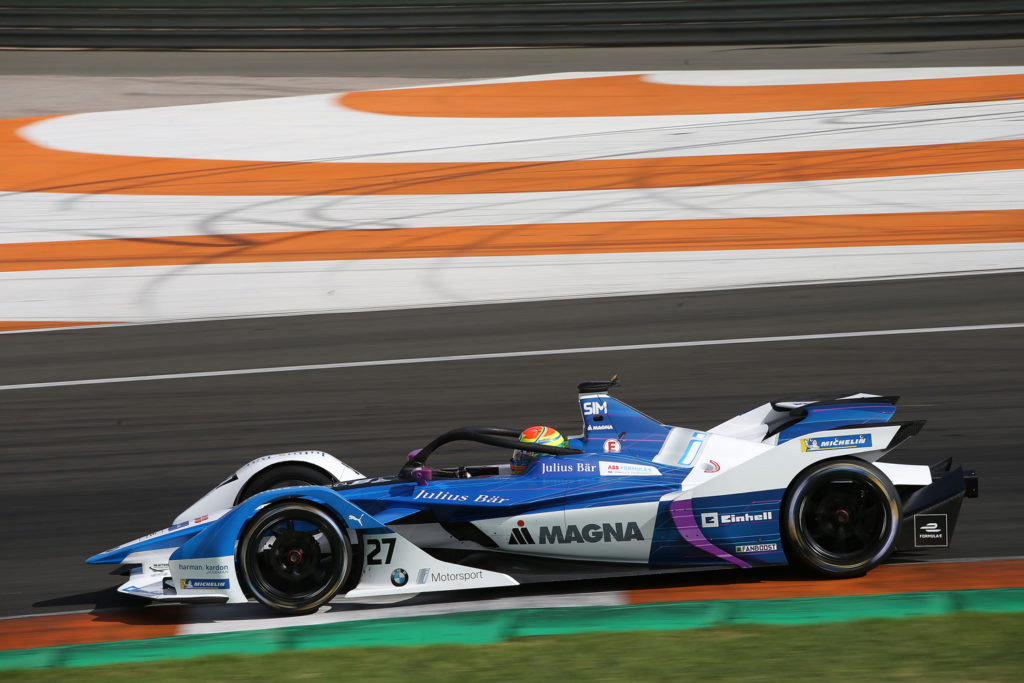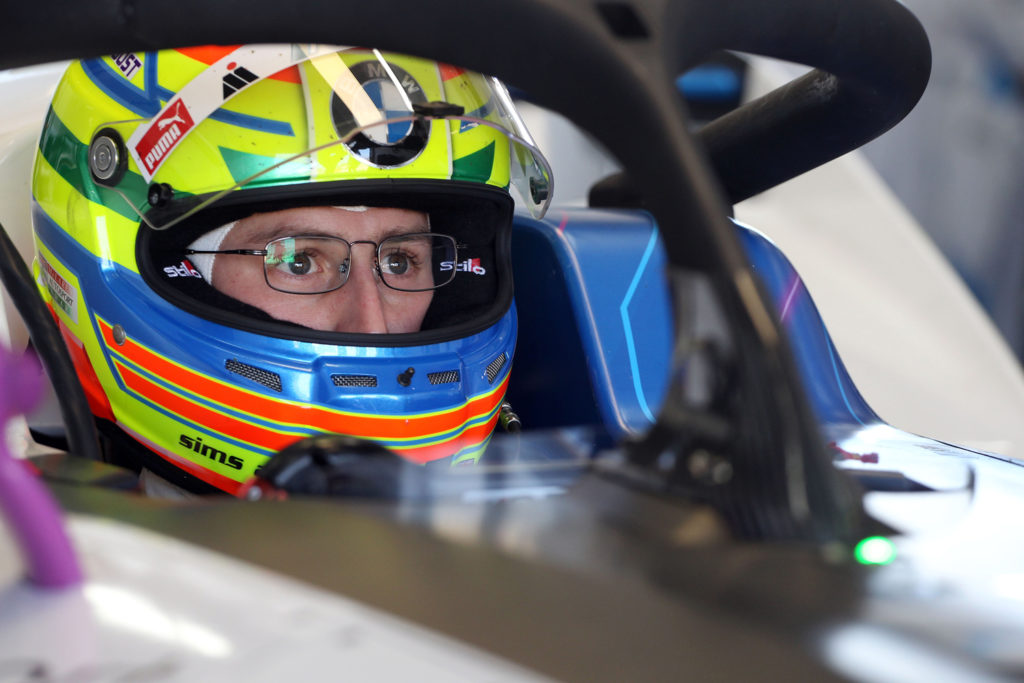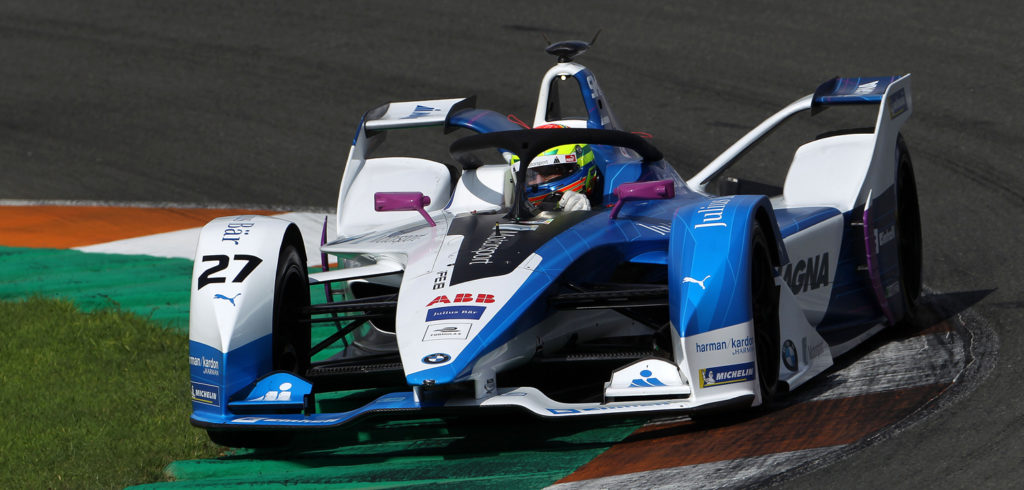Ahead of the opening race in Ad Diriyah, Saudi Arabia, BMW i Andretti Motorsport driver Alexander Sims evaluates the sporting and technical challenges of Formula E.
From a technical perspective: What will be the biggest challenge for you with the BMW iFE.18 compared with a race car with a combustion engine?
It is difficult to name one big challenge as there were many things that required me to adapt my approach. Formula E is so different compared to conventional racing. One thing that really surprised me was the amount of freedom I had in improving the software to fit perfectly to my driving style.
For most of my career in single seater and GT racing there was a limited number of things that you could realistically change for the driver. The beauty of the electric motor is that it’s so flexible in what it can offer. Another big topic for me is understanding all the systems you have in the Formula E car to manage the energy. Racing other guys wheel-to-wheel and at the same time thinking of your energy management and race strategy requires a lot of multitasking. All in all, Formula E will be a fantastic mental challenge – and a lot of fun!
BMW uses Formula E as tech lab for iNEXT. How do you, as a driver, see the synergies between series development and motorsport?
Our part in this development circle between motorsport and series development is to learn things on the track that can be used in the development process for the next generations of electric engines. In motorsport we have the ability to make short-term changes to improve things very quickly. When we have a problem, we need to have a solution in only a few weeks’ or even days’ time. This speed of development in motorsport is always superior to the series development.
How interested are you in the technical aspect of Formula E? Do you talk to the engineers about details of the drivetrain?
For me it was really interesting to do some of the early tests and to meet the design engineers that you usually don’t see at race weekends. I enjoyed talking to them about the characteristics of the drivetrain. Honestly, I am even more interested in the technical details of the BMW iFE.18 than in the details of a combustion engine car. I personally just feel more attracted to e-mobility.
 You strongly support the EV progress in general. Please tell us about it.
You strongly support the EV progress in general. Please tell us about it.
In Great Britain, I am chairman of the charity organization ‘Zero Carbon World’. We provide free charging stations for electric cars to small businesses like hotels, public attractions or car parks. We basically try to strengthen the infrastructure of charging stations wherever we feel it’s necessary.
What level of development has e-mobility reached these days?
I see a huge development. When I got my first electric car six or seven years ago there was no charging network. I had to use extension cables from hotel bedrooms through the window to charge my car. Compared to that the standard we have now is quite impressive and I’m pleased with it.
But realistically we are still in a transition phase. A lot has been done already and a lot more has to be done in the future of course to create an infrastructure for many more electric cars on the streets. But for me nowadays driving an electric car in Great Britain has no compromises.
As a BMW works driver you have been very successful in GT racing so far. But you have a lot of experience in single seaters as well, right?
Yes. I took a pretty conventional path in single seater racing, I think. I started with two years of Formula Renault, then I did two years of Formula 3 Euro Series. After that I did one year of GP3. Once I started GT racing in 2012 I actually still did some Formula 3 and GP3 races, but my main focus quickly switched to racing with BMW Motorsport. My last single seater race was the 2016 Macau F3 Grand Prix.
You drove many different BMW race cars in the past years. Will this versatility help you to adapt quickly to Formula E?
Having the experience of driving lots of different race cars for sure broadens the range of skills you can draw from. That helps a lot when adapting to Formula E which requires a different approach in many aspects compared to conventional cars and circuits. I have learned to understand the strengths and weaknesses of many different cars and how to get the best possible lap time out of it on different kinds of circuits. Adapting quickly will be a big thing in Formula E with all its different and mostly bumpy street circuits. I’ve already talked a lot to António Félix da Costa about it. He can help me a lot with his experience.

What do you make of the promising test results at Valencia?
So far things look good, but it’s one thing to do a fast lap at Valencia where the open circuit doesn’t punish you for every small mistake, whereas on a narrow street circuit things look very different. I think the BMW iFE.18 is a great car, but for me as a rookie the race weekends will be a big challenge. I don’t expect to be on top from race one. I will have to learn a lot in such a difficult and competitive championship as Formula E.
What are you looking forward to most in Formula E?
I expect the race weekends, with their high intensity, to be a lot of fun. We have a tight schedule that requires making fast decisions together with the engineers. Also, the races themselves will be great. I’m really excited to get back to racing on street circuits. They are usually among the best tracks in the world and always add something special to the races.
Looking at your race debut in Formula E – what are your expectations for the season-opener in Ad Diriyah?
Let’s say I’m cautiously optimistic. I’m really confident in the work the BMW i Andretti Motorsport Team will do. They have fantastic engineers and a lot of experience, but I’m a rookie and don’t want to overpromise anything. I hope for the best, but I’m also prepared for difficult times.



